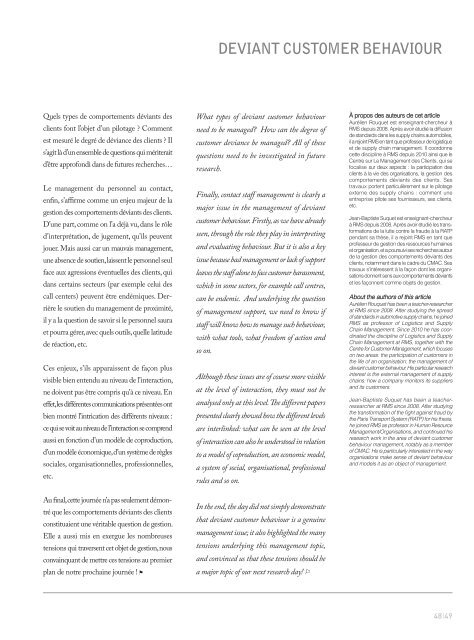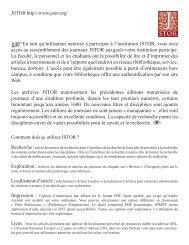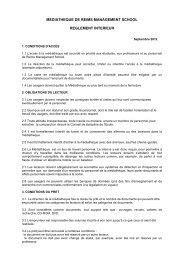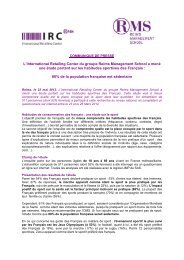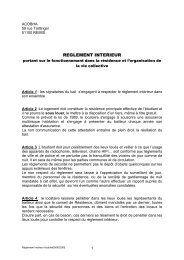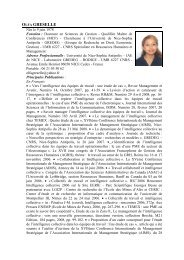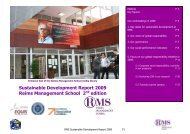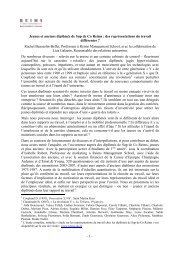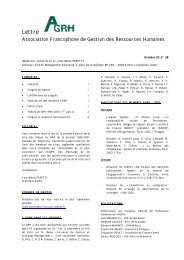tÉLÉCHARGEZ ICI ! le dernier numéro du magazine - Reims ...
tÉLÉCHARGEZ ICI ! le dernier numéro du magazine - Reims ...
tÉLÉCHARGEZ ICI ! le dernier numéro du magazine - Reims ...
You also want an ePaper? Increase the reach of your titles
YUMPU automatically turns print PDFs into web optimized ePapers that Google loves.
Quels types de comportements déviants des<br />
clients font l’objet d’un pilotage ? Comment<br />
est mesuré <strong>le</strong> degré de déviance des clients ? Il<br />
s’agit là d’un ensemb<strong>le</strong> de questions qui mériterait<br />
d’être approfondi dans de futures recherches…<br />
Le management <strong>du</strong> personnel au contact,<br />
enfin, s’affirme comme un enjeu majeur de la<br />
gestion des comportements déviants des clients.<br />
D’une part, comme on l’a déjà vu, dans <strong>le</strong> rô<strong>le</strong><br />
d’interprétation, de jugement, qu’ils peuvent<br />
jouer. Mais aussi car un mauvais management,<br />
une absence de soutien, laissent <strong>le</strong> personnel seul<br />
face aux agressions éventuel<strong>le</strong>s des clients, qui<br />
dans certains secteurs (par exemp<strong>le</strong> celui des<br />
call centers) peuvent être endémiques. Derrière<br />
<strong>le</strong> soutien <strong>du</strong> management de proximité,<br />
il y a la question de savoir si <strong>le</strong> personnel saura<br />
et pourra gérer, avec quels outils, quel<strong>le</strong> latitude<br />
de réaction, etc.<br />
Ces enjeux, s’ils apparaissent de façon plus<br />
visib<strong>le</strong> bien enten<strong>du</strong> au niveau de l’interaction,<br />
ne doivent pas être compris qu’à ce niveau. En<br />
effet, <strong>le</strong>s différentes communications présentées ont<br />
bien montré l’intrication des différents niveaux :<br />
ce qui se voit au niveau de l’interaction se comprend<br />
aussi en fonction d’un modè<strong>le</strong> de copro<strong>du</strong>ction,<br />
d’un modè<strong>le</strong> économique, d’un système de règ<strong>le</strong>s<br />
socia<strong>le</strong>s, organisationnel<strong>le</strong>s, professionnel<strong>le</strong>s,<br />
etc.<br />
Au final, cette journée n’a pas seu<strong>le</strong>ment démon-<br />
tré que <strong>le</strong>s comportements déviants des clients<br />
constituaient une véritab<strong>le</strong> question de gestion.<br />
El<strong>le</strong> a aussi mis en exergue <strong>le</strong>s nombreuses<br />
tensions qui traversent cet objet de gestion, nous<br />
convainquant de mettre ces tensions au premier<br />
plan de notre prochaine journée ! ⚑<br />
DEVIANT CUSTOMER BEHAVIOUR<br />
What types of deviant customer behaviour<br />
need to be managed? How can the degree of<br />
customer deviance be managed? All of these<br />
questions need to be investigated in future<br />
research.<br />
Finally, contact staff management is c<strong>le</strong>arly a<br />
major issue in the management of deviant<br />
customer behaviour. Firstly, as we have already<br />
seen, through the ro<strong>le</strong> they play in interpreting<br />
and evaluating behaviour. But it is also a key<br />
issue because bad management or lack of support<br />
<strong>le</strong>aves the staff alone to face customer harassment,<br />
which in some sectors, for examp<strong>le</strong> call centres,<br />
can be endemic. And underlying the question<br />
of management support, we need to know if<br />
staff will know how to manage such behaviour,<br />
with what tools, what freedom of action and<br />
so on.<br />
Although these issues are of course more visib<strong>le</strong><br />
at the <strong>le</strong>vel of interaction, they must not be<br />
analysed only at this <strong>le</strong>vel. The different papers<br />
presented c<strong>le</strong>arly showed how the different <strong>le</strong>vels<br />
are interlinked: what can be seen at the <strong>le</strong>vel<br />
of interaction can also be understood in relation<br />
to a model of copro<strong>du</strong>ction, an economic model,<br />
a system of social, organisational, professional<br />
ru<strong>le</strong>s and so on.<br />
In the end, the day did not simply demonstrate<br />
that deviant customer behaviour is a genuine<br />
management issue; it also highlighted the many<br />
tensions underlying this management topic,<br />
and convinced us that these tensions should be<br />
a major topic of our next research day! ⚐<br />
À propos des auteurs de cet artic<strong>le</strong><br />
Aurélien Rouquet est enseignant-chercheur à<br />
RMS depuis 2008. Après avoir étudié la diffusion<br />
de standards dans <strong>le</strong>s supply chains automobi<strong>le</strong>s,<br />
il a rejoint RMS en tant que professeur de logistique<br />
et de supply chain management. Il coordonne<br />
cette discipline à RMS depuis 2010 ainsi que <strong>le</strong><br />
Centre sur Le Management des Clients, qui se<br />
focalise sur deux aspects : la participation des<br />
clients à la vie des organisations, la gestion des<br />
comportements déviants des clients. Ses<br />
travaux portent particulièrement sur <strong>le</strong> pilotage<br />
externe des supply chains : comment une<br />
entreprise pilote ses fournisseurs, ses clients,<br />
etc.<br />
Jean-Baptiste Suquet est enseignant-chercheur<br />
à RMS depuis 2008. Après avoir étudié <strong>le</strong>s transformations<br />
de la lutte contre la fraude à la RATP<br />
pendant sa thèse, il a rejoint RMS en tant que<br />
professeur de gestion des ressources humaines<br />
et organisation, et a poursuivi ses recherches autour<br />
de la gestion des comportements déviants des<br />
clients, notamment dans <strong>le</strong> cadre <strong>du</strong> CMAC. Ses<br />
travaux s'intéressent à la façon dont <strong>le</strong>s organisations<br />
donnent sens aux comportements déviants<br />
et <strong>le</strong>s façonnent comme objets de gestion.<br />
About the authors of this artic<strong>le</strong><br />
Aurélien Rouquet has been a teacher-researcher<br />
at RMS since 2008. After studying the spread<br />
of standards in automotive supply chains, he joined<br />
RMS as professor of Logistics and Supply<br />
Chain Management. Since 2010 he has coordinated<br />
the discipline of Logistics and Supply<br />
Chain Management at RMS, together with the<br />
Centre for Customer Management, which focuses<br />
on two areas: the participation of customers in<br />
the life of an organisation; the management of<br />
deviant customer behaviour. His particular research<br />
interest is the external management of supply<br />
chains: how a company monitors its suppliers<br />
and its customers.<br />
Jean-Baptiste Suquet has been a teacherresearcher<br />
at RMS since 2008. After studying<br />
the transformation of the fight against fraud by<br />
the Paris Transport System (RATP) for his thesis,<br />
he joined RMS as professor in Human Resource<br />
Management/Organisations, and continued his<br />
research work in the area of deviant customer<br />
behaviour management, notably as a member<br />
of CMAC. He is particularly interested in the way<br />
organisations make sense of deviant behaviour<br />
and models it as an object of management.<br />
48|49


